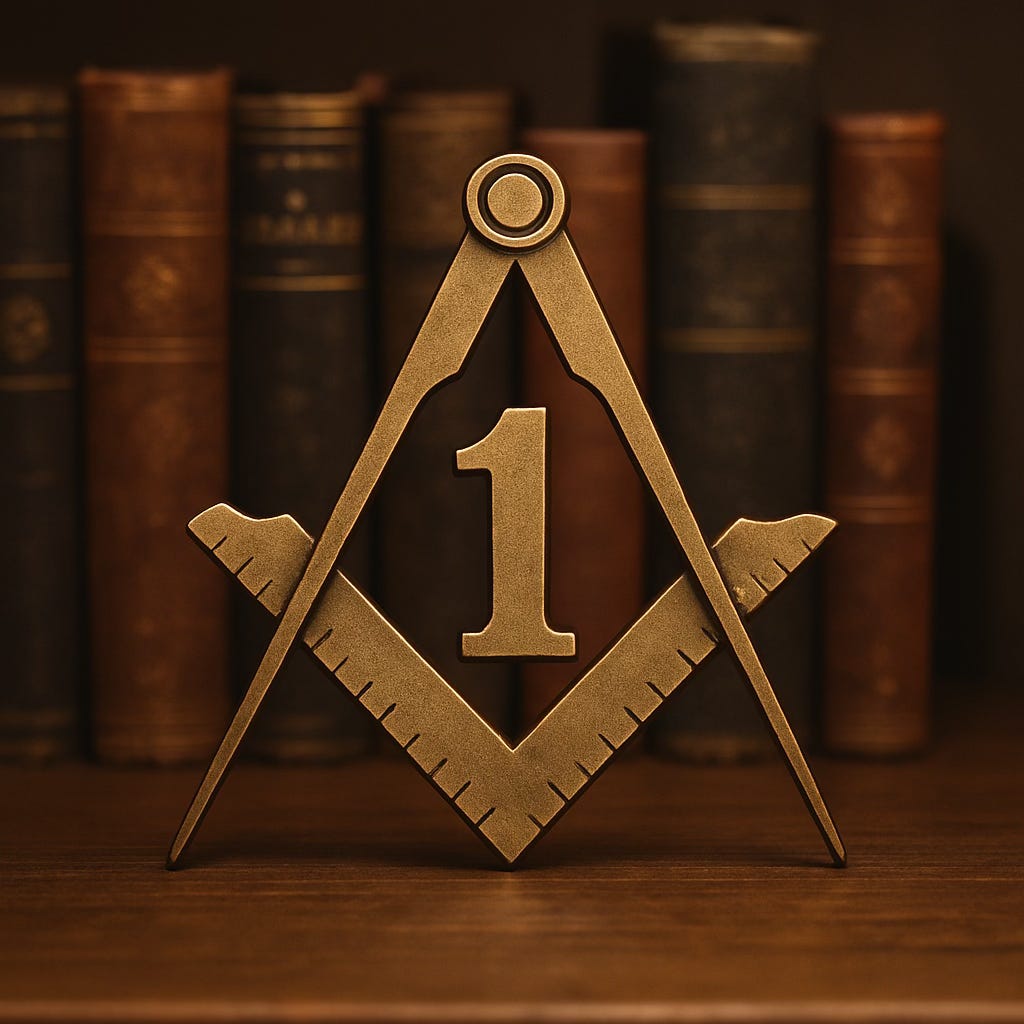The Beginning Mason's Reading List: Where Every Great Masonic Journey Starts
First in an 8-part series: "The Mason's Library"
After my initiation, I thought Masonic education meant learning the ritual and attending meetings. Then a Past Master handed me a copy of "Freemasons for Dummies" and said, "Don't just learn the words. Understand what they mean."
Over the years, I've built a substantial Masonic library and learned which books actually matter for new Masons versus which ones just collect dust.
Starting today, I'm sharing what I've learned in an 8-week series covering essential books for every type of Mason. Each Thursday, we'll focus on a different category, from ritualists to historians to esoteric scholars.
But we're starting with the most important group: new Masons who need solid foundations.
The Beginning Mason's Dilemma
Walk into any Masonic library and you'll face hundreds of books spanning three centuries. For a newly initiated Entered Apprentice, it's overwhelming. Where do you start? Which authors are credible? What's essential versus optional?
I've watched good men get intimidated by the sheer volume and give up on reading altogether. That's unfortunate, because the right books can answer your immediate questions while preparing you for deeper study.
The key is starting with books that explain the basics clearly without dumbing them down.
Four Essential Books for New Masons
These books will give you a solid foundation in Masonic fundamentals:
"Freemasons For Dummies" by Christopher Hodapp
This comprehensive introduction answers the questions every new Mason has: What did I join? How does this organization work? What do these symbols mean?
Hodapp explains complex concepts clearly without oversimplifying them. He covers history, symbols, structure, and modern relevance in accessible language. You'll finish understanding both what Freemasonry is and why it matters today.
Best for: Brothers who want comprehensive answers to immediate questions.
"The Complete Idiot's Guide to Freemasonry" by S. Brent Morris
Morris brings academic credentials to beginner-friendly writing. As a PhD mathematician and prominent Masonic scholar, he separates fact from fiction while explaining core principles and practices.
This book excels at debunking common myths while providing accurate historical context. Morris explains not just what Masons believe, but why those beliefs developed and how they apply practically.
Best for: Brothers who want scholarly accuracy in an accessible format.
"American Freemasons: Three Centuries of Building Communities" by Mark A. Tabbert
This illustrated book from the National Heritage Museum shows how Freemasonry shaped American culture from colonial times to today. It's well-researched visual storytelling that brings abstract concepts to life.
You'll see how ordinary Masons throughout history lived their principles and contributed to their communities. It connects Masonic ideals to real-world impact.
Best for: Visual learners and brothers who want to understand Freemasonry's cultural significance.
"The Allegory of the Cave" by Plato
This short philosophical work (30-minute read) provides the intellectual foundation for Masonic thinking about enlightenment and the journey from ignorance to knowledge.
Every Masonic degree references this progression from darkness to light. Reading Plato's original allegory will deepen your understanding of ritual symbolism and Masonic philosophy.
Best for: Brothers ready to explore the philosophical foundations of the Craft.
How to Approach These Books
Read actively, not passively. Keep notes on insights and questions. Look for connections between what you're reading and what you experience in lodge.
Discuss what you learn with other brothers. The best Masonic education happens through conversation and shared exploration of ideas.
Most importantly, look for ways to apply these insights in daily life. Knowledge without application is just trivia.
Recommended Reading Sequence
Weeks 1-2: Start with either Hodapp or Morris, depending on whether you prefer comprehensive coverage or scholarly approach.
Week 3: Read Tabbert for historical context and visual perspective.
Week 4: Read Plato's Allegory to understand philosophical foundations.
Week 5+: Move into specialized areas that match your interests.
Coming in This Series
Over the next seven weeks, we'll cover books for every type of Mason:
Next Thursday: The Ritualist Mason: books for degree work and ceremonial excellence
Week 3: The Historical Mason: scholarly works on Masonic history
Week 4: The Leadership Mason: practical guides for officers and leaders
Week 5: The Weekend Mason: short reads with significant impact
Week 6: The Esoteric Mason: symbolic and mystical interpretations
Week 7: The Philosophical Mason: fundamental questions and big ideas
Week 8: Family & Deep Dives: books for loved ones and specialized topics
Start Here
These four books provide essential foundations for any new Mason:
Masonic education is ongoing. These books give you the foundation to continue learning effectively.
The goal is understanding the principles well enough to apply them.
What was the first Masonic book that made a difference for you? Share your experience in the comments.
Next Thursday: "The Ritualist Mason's Library", essential books for brothers focused on degree work and ceremonial excellence.


